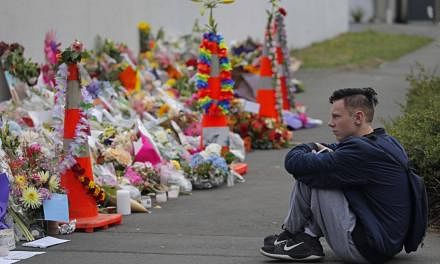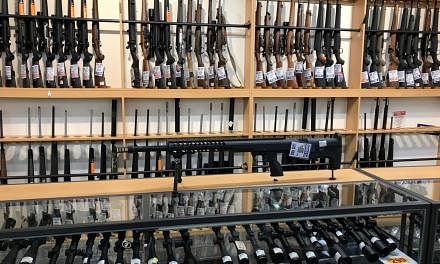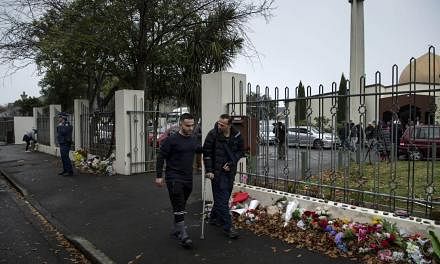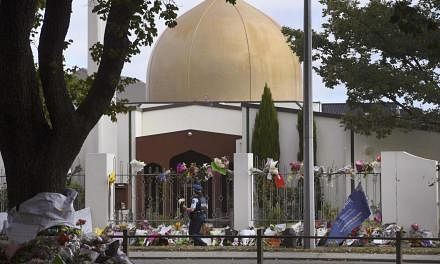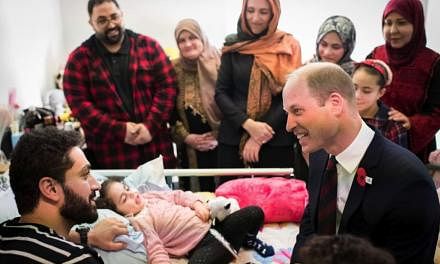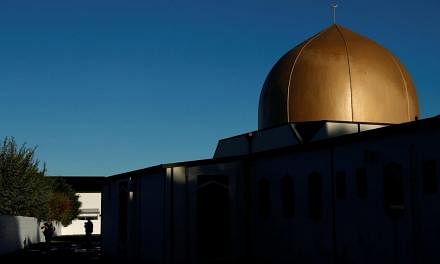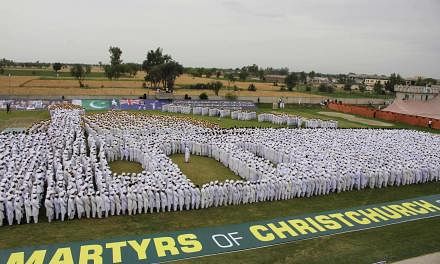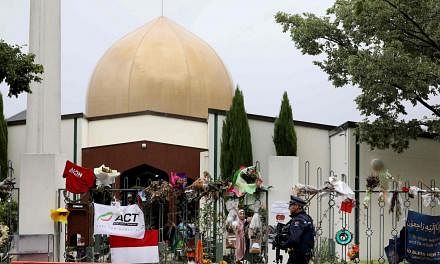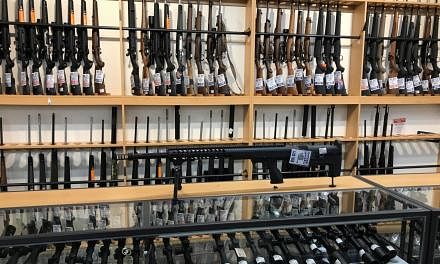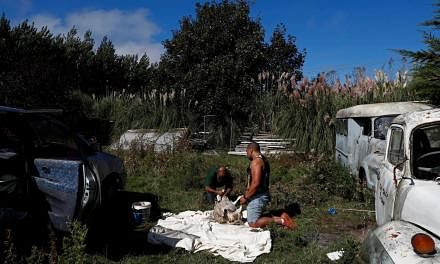CHRISTCHURCH (REUTERS, BLOOMBERG) - New Zealand Prime Minister Jacinda Ardern said on Monday (March 18) she would announce new gun laws within days, after a lone gunman killed 50 people in mass shootings at two mosques in the city of Christchurch.
Australian Brenton Tarrant, 28, a suspected white supremacist, was charged with murder on Saturday (March 16). Tarrant was remanded without a plea and is due back in court on April 5 where police said he was likely to face more charges.
"Within 10 days of this horrific act of terrorism we will have announced reforms which will, I believe, make our community safer," Ms Ardern said at news conference after her Cabinet reached in principle decisions on gun reform laws in the wake of New Zealand's worst ever mass shooting.
In addition to the 50 killed, dozens were wounded at the two mosques in the South Island city during Friday prayers.
Gun City owner David Tipple said the alleged gunman bought four weapons and ammunition online from the store between December 2017 and March 2018, but it did not sell him the high-powered weapon used in the massacre.
"The MSSA, military-style automatic, reportedly used by the alleged gunman was not purchased from Gun City. Gun City did not sell him an MSSA, only A-category firearms," Mr Tipple told a news conference in Christchurch.
Under New Zealand gun laws, A-category weapons can be semi-automatic but limited to seven shots. Live-streamed video of a gunman in one mosque showed a semi-automatic weapon with a large magazine round.
Mr Tipple said the online purchases followed a police-verified online mail-order process and the store detected nothing extraordinary about the licence holder.
Mr Tipple said he supported Ms Ardern's move to reform gun laws as the Christchurch shootings had raised legitimate concerns.
Ms Ardern did not detail the new gun laws, but has said she supports a ban on automatic weapons following the Christchurch shootings.
Australia introduced some of the world's toughest gun laws after its worst mass killing, the 1996 Port Arthur massacre in which a lone gunman killed 35 people using a semi-automatic AR-15 - the same weapon used in the Christchurch massacre.
Australia banned semi-automatic weapons, launched a national gun amnesty in which tens of thousands of guns were handed in, and made it much tougher to own firearms.
GUNOWNERS SURRENDER WEAPONS
"Until today I was one of the New Zealanders who owned a semi-automatic rifle. On the farm they are a useful tool in some circumstances, but my convenience doesn't outweigh the risk of misuse," Mr John Hart, a farmer and Green Party candidate from Masterton said on Twitter on Monday.
"We don't need these in our country. We have make sure it's #NeverAgain." New Zealand's top online marketplace Trade Me Group said it was halting the sale of semi-automatic weapons in the wake of Friday's (March 15) attack.
New Zealand, a country of only 5 million people, has an estimated 1.5 million firearms.
Civilian gun ownership in New Zealand has increased 62 per cent since 2005, according to GunPolicy.org, a firearm prevention group, with the total number of weapons, both legal and illicit, reaching 1.5 million in 2017.
Nevertheless, murders using guns are rare. In the decade to 2015, there were only two years in which the number of such homicides reached 10 or more. The nation's overall homicide rate of 1.2 per 100,000 people is well below the global rate of 6.4, according to a World Health Organisation report from 2015.
Gun licences can be obtained starting at 16 years of age. Residents must show up at their police arms office, typically at the police station, to apply in person. There are restrictions on semi-automatic guns, and the licences of gun dealers must be renewed annually.
A Radio New Zealand report, based on police data secured through an Official Information Act request, said more than 99 percent of people who applied for a firearms licence in 2017 were successful.
A New Zealand standard A-category firearm licence is issued after a police and background check. No licence is required to buy a large round magazine, which can be illegally modified for use in such a weapon.
Only firearm owners are licensed, not weapons, so there is no monitoring of how many weapons a person may possess.
Violent crime is rare in New Zealand and police do not usually carry guns. Before Friday, New Zealand's worst mass shooting was in 1990 when a man killed 13 men, women and children in a 24-hour rampage in the tiny seaside village of Aramoana. He was killed by police.
Ms Ardern said an inquiry will be held into what intelligence, police, customs and immigration knew or should have known about Tarrant and the events leading up to the massacre, to see whether the attack could have been prevented.
Ms Ardern said Tarrant had e-mailed a "manifesto" to more than 30 recipients including her office, nine minutes before the attack but it gave no location or specific details.
In the document, which was also posted online, Tarrant described himself as "Just a ordinary White man, 28 years old".
BURIAL FRUSTRATIONS
Ms Ardern was the first signatory of a national condolence book for the country's worst mass killing that she opened in the capital Wellington on Monday.
"On behalf of all New Zealanders, we grieve together. We are one. They are us," she wrote in the book.
Frustration was building among the families of victims as under Islam it is custom to conduct burials within 24 hours, but bodies will not be released until post mortems are carried out.
Deputy Police Commissioner Wally Haumaha said the first body was approved for release on Sunday night, but the family was yet to take the body because another relative was also killed and they wanted to collect them together. He said there would be no burials on Monday.
The burial process, which usually involves washing with three kinds of water, salving wounds and scrubbing skin, would be complicated, volunteers in Christchurch said.
Mr Mo, a volunteer who had flown in from Brisbane to wash the bodies, said the people who died in the mosques were classified as martyrs. That meant there were different views as to whether they would be washed or not because he said Islamic jurisprudence said martyrs are not to be washed as their blood was witness to their martyrdom.
"But some people have said because it was not a battlefield it is okay to wash the body. But it is at the discretion of the family," said Mr Mo. He asked to be identified by just one name.
Ms Rehanna Ali, from the Federation of Islamic Associations of New Zealand, said: "These people died in prayer, on their way to prayer, on our holy day, a Friday, in the precincts of our holy places. And faith was what they died for. And so faith is now part of the healing process for their loved ones."
The two mosques involved in the shootings have been closed since the massacre, but are expected to reopen by Friday prayers after cleansing blessings were carried out, said Mr Haumaha.
Muslim leaders conveyed messages of love, compassion and appreciation for the community support they had received.
Over the weekend and into Monday, tens of thousands of people flocked to memorial vigils around New Zealand and a victim support website raised more than NZ$5.5 million (S$5.1 million).

